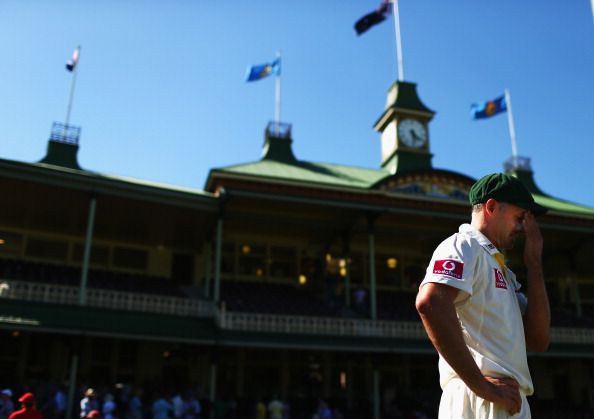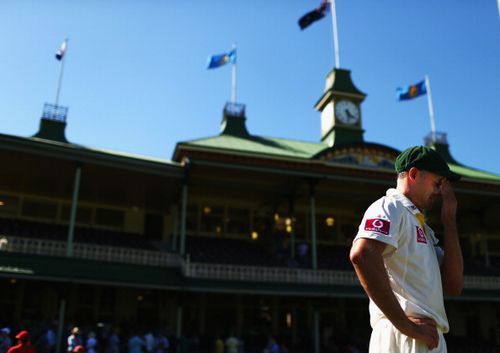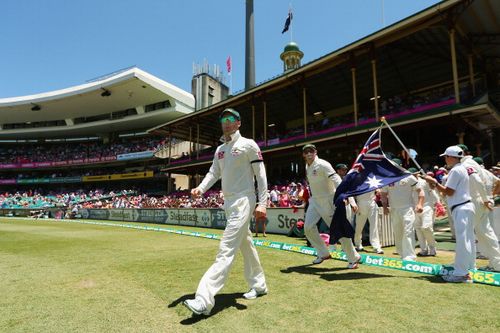
Cricket needs the Aussies back to their competitive best

It wasn’t so long ago for people to have forgotten England’s victory over Australia in 2005 to regain the Ashes. It wasn’t a clean victory for Michael Vaughan’s England though. They only just about managed to scrape through with a series win. And it was a big thing back then for England to have beaten Australia as the Kangaroos were only thinking of another whitewash over the Poms when they arrived on the English shores. Experts hailed Vaughan the Captain and Flintoff the Warrior.
David beat Goliath.
More than a decade has passed since Indians scripted their miraculous come-from-behind series win over the Australians. It was, as Steve Waugh so succinctly put it, the final frontier for the Australians as it was the only country left to be beaten in their own backyard. Harbhajan Singh and VVS Laxman became national icons and Sourav Ganguly well and truly announced his arrival as India’s greatest captain. India had done the impossible and had defeated the mighty Aussies.
David beat Goliath again.
In the recent Ashes series, England beat Australia down under 3-1. While the series defeat itself is a huge thing, as beating Australia in Australia was considered next to impossible, especially for an English team, all 3 victories were by an innings margin. Never in the history of the Ashes has any side won 3 Test matches in a series by an innings.
In the recently concluded Border-Gavaskar trophy, India completed an Aussie whitewash, winning the series 4-0. India, in a 4 Test match series, have never done that before.
While you can expect all teams to falter at some point, the manner in which they lost both the series and the repercussions (or lack thereof) afterwards, point to something very disturbing.
The Australians no longer cared enough to win.
Analyse this. Over the past 15 years, the Aussies have done anything and everything they could to defeat their opponents. They even resorted to sledging to derail the concentration of the opposite players. It was justified under the headline of “will to win”. Glenn McGrath was on record saying that the need to win, whether in sports or any other occupation, was so ingrained in the Australian culture and that’s the reason why you see the Aussies fighting tooth and nail to win every match.
But now, they are meekly surrendering to the opposition, which begs the question: Has the Aussie dominance come to an end?
Normally, when you ponder over such questions, it would be ridiculous to jump to conclusions. But one only needs to look at history for a glaring example.
It was not too long ago that West Indies was a force to be feared in international cricket. The fast bowlers were a nightmare to bat against and it was a brave man who could face them without shivers going down his spine. They would decimate any team that they would play against. Their dominance of the cricketing world was evident when they won the first two World Cups and came ever so close to completing a hattrick. But the 90s saw a steady decline in the quality of players coming through to the team. While they still had some extraordinary players in Walsh, Ambrose and Lara, there were not enough people in the team to scare the opposition. On their day, they could still beat any team but it was clear that the opposition did not have to fear them like in the days past. And now, they are nothing but a shadow of their former selves, and nowhere close to being the dominant force they once were.
There have been many reasons put forward as to why the West Indies cricket team could not sustain their dominance. Some claim complacency crept in and not enough was done at the grass roots level to get more quality players. Others claim the youngsters were more attracted towards other sports like basketball, where there was more money to be earned. While some others claim that the different regions under the West Indies board resorted to in-fighting, which caused a lot of damage. Whatever may be the reason, the result is there for everyone to see. West Indies, till only a few years ago, only made up the numbers and weren’t, until their resurgence lately, a legitimate threat.
While the West Indies were going on a downward spiral, there was a vacuum at the top for about 10 years, with different teams trying to wrest control of the top dog status. Pakistan, South Africa and Australia were top contenders, but it was the Aussies who did it and had been there ever since. While the occasional series defeats did come, there was never a serious threat to anyone taking their No. 1 status.
Until now.

Now, Australians find themselves in the same situation West Indies were in. The players coming in are not of the same quality. They have not been able to replace either McGrath or Warne. While Gilchrist was more than a good replacement for Healy, the same cannot be said of Gilly’s successors. And with so many stalwarts retiring from the game, the Australian side finds themselves in a precarious position, which, if not addressed, would be disastrous. With India, England and current Test mace holders South Africa having held the top position now since Australia vanquished it, time is not something Australia can afford to lose if they want to continue to be a super power in cricket.
It is an undeniable fact that cricket misses the West Indies cricket team. A certain glamour has been lost from the game. But the sport cannot afford to lose the Australians too. It will affect the long term success of cricket if only 2 or 3 teams can genuinely call themselves competitive.
History teaches us that dynasties come and go, and everything is a circle. First, it was the Mayans, then the Europeans, now it’s the Americans who rule the world. Soon it may be the Chinese. While life does imitate art, the reverse need not be the same when it comes to sport. The Australians can and should be able to come back and be their competitive best. But the signs are not good. Meek submission to the opposition is not what you associate with the Aussies.
If that happens, at the end of the day, cricket will not be the winner.